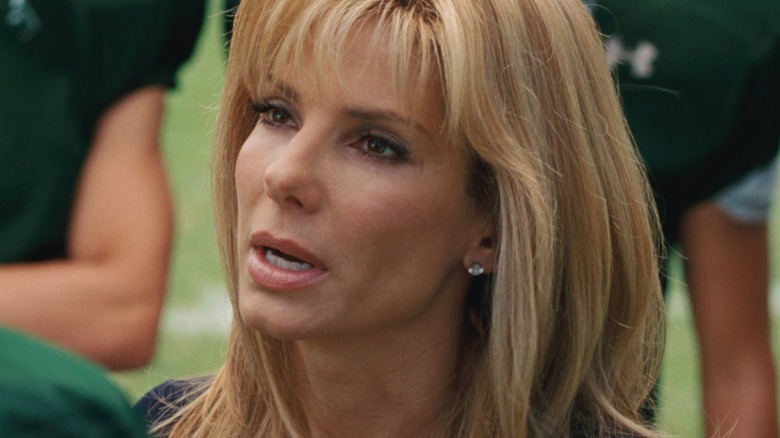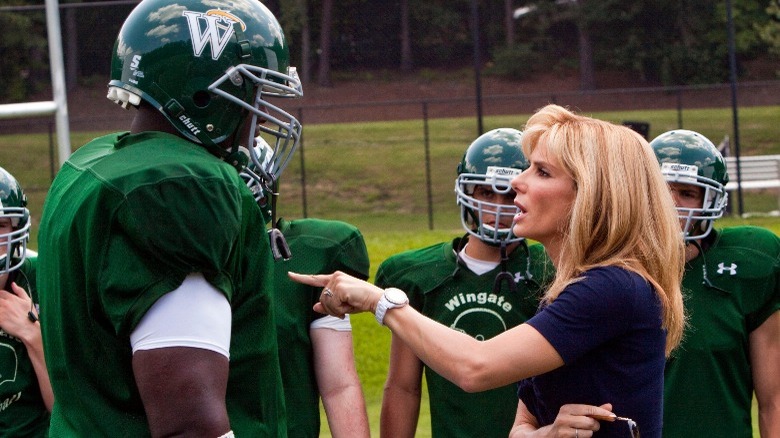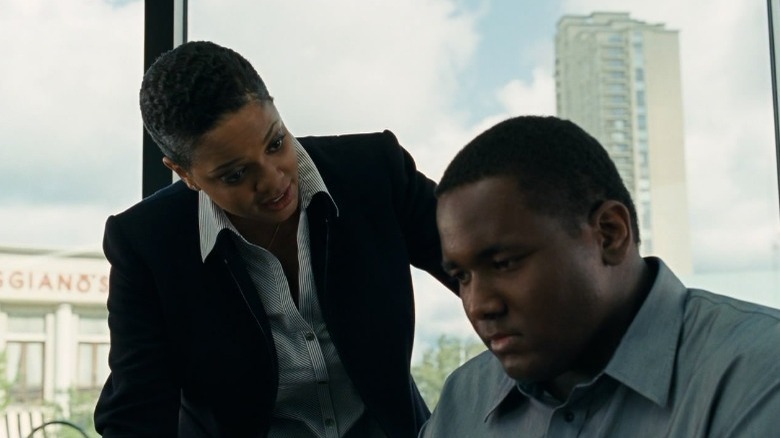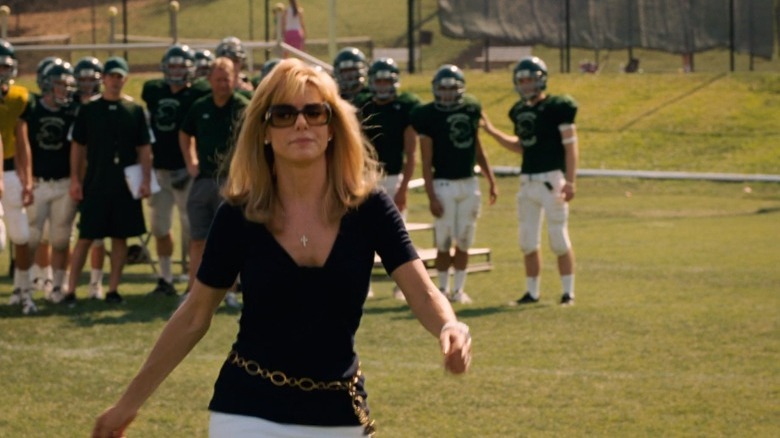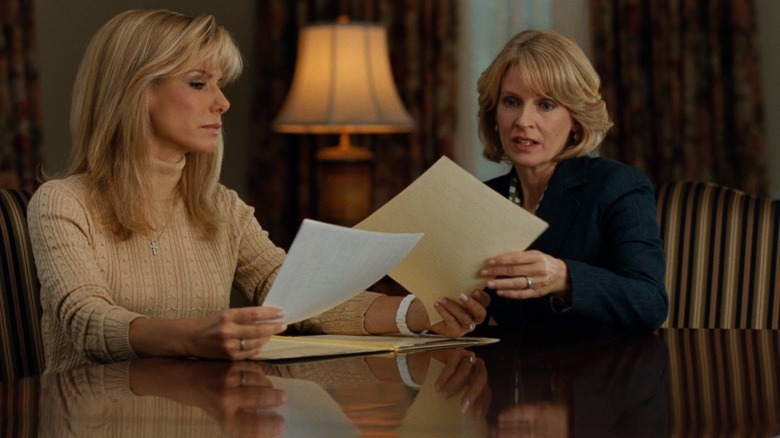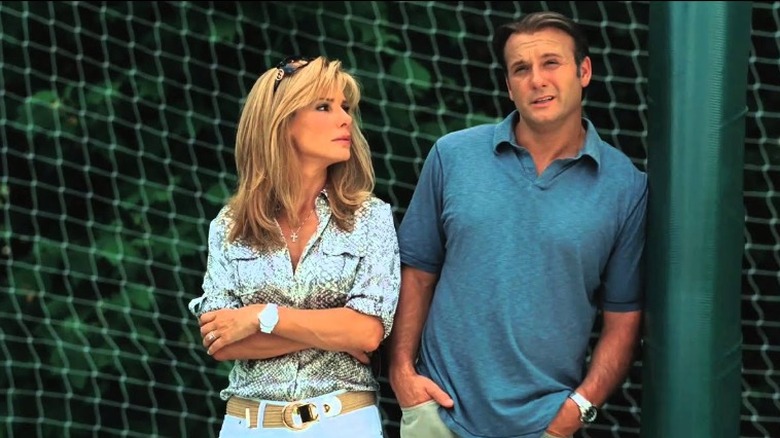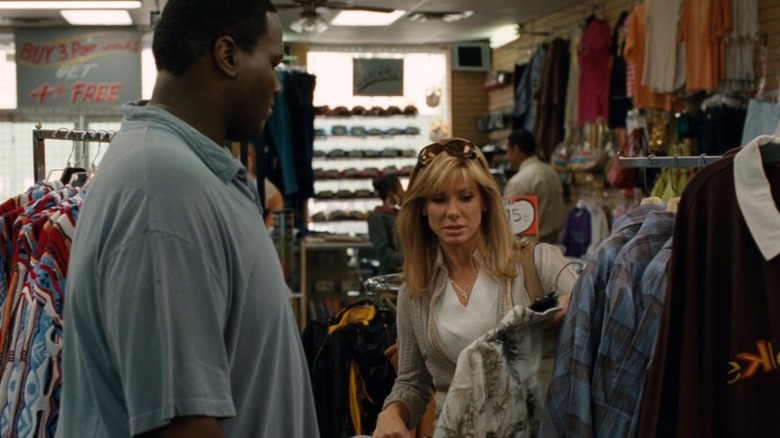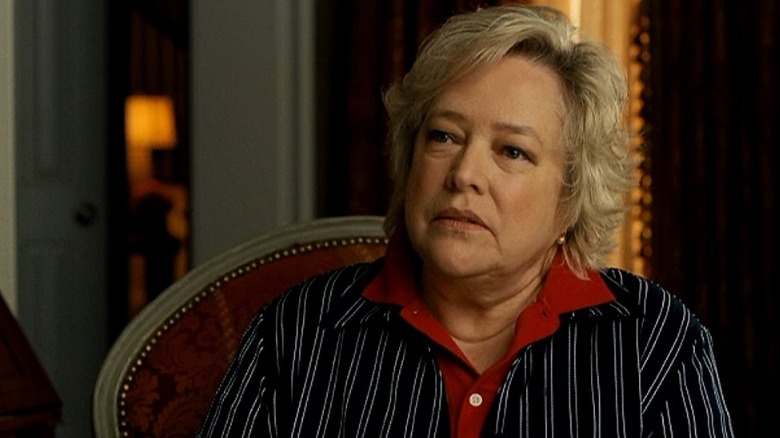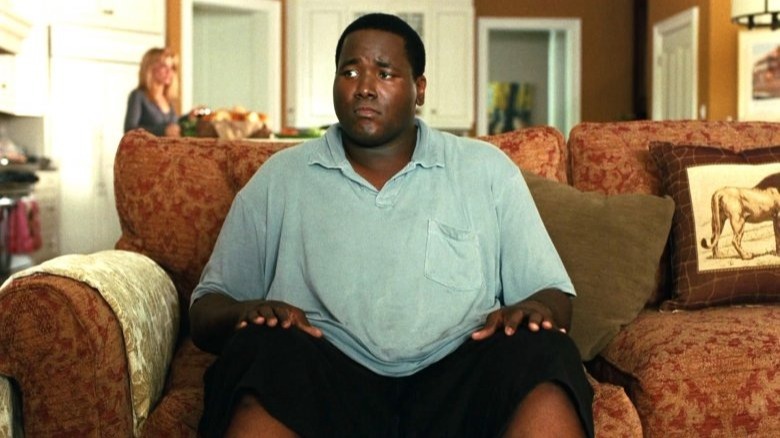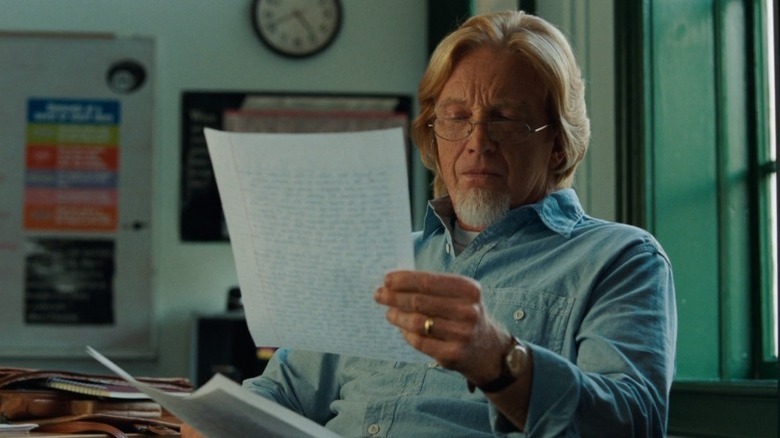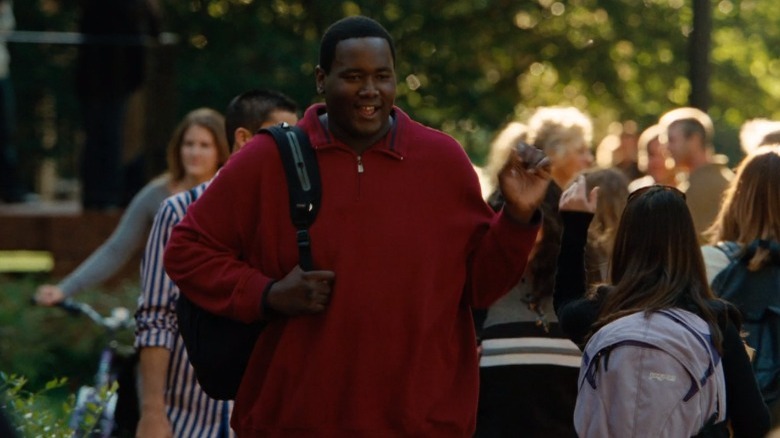Things Only Adults Notice In The Blind Side
Three movies have been adapted from books by best-selling author and financial journalist Michael Lewis. But while "Moneyball" and "The Big Short" are synonymous with the books that they're inspired by, and focus heavily on the economic ideas therein, 2009's "The Blind Side" stands apart. It basically only adapts half of Lewis' 2006 book "The Blind Side: Evolution of a Game" — specifically, the part that follows the story of NFL offensive lineman Michael Oher (who had some mixed feelings about the movie), and confines the whole "evolution of a game" portion to the opening voiceover. The result is less of a heady, quasi-fictional diatribe about revolutionary ideas, winding up with more of a Hallmark Channel Original vibe.
Perhaps that focus on an inspirational, mostly true story of rags-to-riches success is why the movie won Sandra Bullock an Oscar and was a phenomenal word-of-mouth box office success. But it leaves "The Blind Side" as a strange cultural document that felt somewhat dated in its wide-eyed approach to race relations as soon as it came out, and it's only aged even more strangely as the years have passed.
Without the focus Lewis' book has on the changing nature of the left tackle position and the game of football, "The Blind Side" meanders from scene to scene with a kind of aimlessness. There's not much conflict and even less reflection on its supposed themes of poverty and familial obligation. Not much attention is even paid to football. It's the exact sort of movie, engineered for mass appeal, that raises questions in retrospect as viewers look back on it with an older perspective. These are the things only adults notice in "The Blind Side."
The Blind Side is not a football movie
If you were to list, say, the best 60 sports movies of all time and didn't include "The Blind Side," that would be eminently fair because it contains barely any football. Aside from a brief highlight of Lawrence Taylor's famous sack of Joe Theismann in the opening, football isn't even glimpsed until more than an hour into a two-hour film. From there, a grand total of three football games are depicted, and only in the first one does "The Blind Side" bother to let us know what the score of the game is at any point, or which team wins. The focus is much more on the emotional journey of Michael (Quinton Aaron), and how tips from his adoptive mother Leigh Anne (Sandra Bullock, in her QVC Shopping Network best outfits) help him harness his protective instincts to play lineman.
As wizened fans of the NBC TV adaptation of "Friday Night Lights" can attest, a lack of focus on football action doesn't necessarily mean your football story suffers. That show famously emphasizes characters and the story on the other days of the week, and confines football to just its most dramatic moments, but "The Blind Side" doesn't even have that. The only extended football sequence is when Michael is being relentlessly bullied by the opposing team, and it makes football seem miserable. It's not even clear why or if Michael wants to play football, everyone just kind of goes with it because he's so big. Near the end of the film, when Leigh Anne asks him if he even likes football, all he can muster is a bland "I guess so."
The NCAA is presented as the villain
Since Michael never has an internal conflict about playing football, and even his troubled family history doesn't come up too often, "The Blind Side" finds itself in danger of becoming a live action Disney movie that doesn't have a villain. So it presents a menacing investigator from the National Collegiate Athletic Association, an organization that (theoretically) exists to protect the best interests of student athletes, as the main antagonists of the film. A character credited only as "Investigator Granger" (Sharon Conley) grills Michael on the circumstances of his decision to attend Ole Miss, in a scene that frames the entire movie and is frustratingly silly.
Granger's job, in theory, is to make sure that Michael wasn't unduly or improperly pressured into choosing Ole Miss by his adoptive parents and private tutor (who all went there themselves) or his high school coach (who took a job there not long after Michael made his decision, a fact the movie barely mentions). So she very sternly pressures Michael for details about any pressure he might have faced, and all but grills him like he's a murder suspect with ten minutes left in a "Law and Order" episode.
As ambivalent about football as "The Blind Side" is, it clearly has an editorial opinion about college football and how mean it is to imply there are recruitment violations. In reality, violations throughout college sports are so frequent there's an entire Associated Press tag for them. But perhaps to secure several cameos from actual college football coaches, "The Blind Side" makes sure to include a mean ol' NCAA investigator who wants to spoil everyone's fun.
The entire football team checks out Leigh Anne
The suspension of disbelief is a delicate balance in movies. In every movie in Sandra Bullock's career, you have to deal with not just the normal amount of it (Could the bus in "Speed" really make that jump? Would George Clooney's character in "Gravity" really keep floating away?) with an additional, nagging thought: gosh, this woman is as beautiful as Sandra Bullock. This is a normal tension in movies that star attractive celebrities, but "The Blind Side" often amplifies it by putting Bullock in the bright, form-fitting outfits of the real Leigh Anne Tuohy.
In at least one scene, this is too much for the entirety of Michael's high school football team to ignore. In a moment that stands out as the only even mildly risqué bit in an otherwise family-friendly movie, they all tilt their heads and lean in unison to watch Leigh Anne "blind side" as she walks away— for good measure a couple of adult coaches join in. It's meant to be funny, but it isn't clear who exactly the moment is for in such a straightforwardly earnest movie.
Leigh Anne has an absurd amount of access to Michael's records
There's a quick joke near the end of "The Blind Side" implying that Leigh Anne has somehow hacked the records of Michael's school's principal to confirm that he finished with a high enough GPA to attend college. It's laughed away by her husband Sean (Tim McGraw), but at least by this point in time she's Michael's legal guardian. For the majority of the film, she seemingly has access to any record that she wants to see, well before that seems appropriate.
Just days after Michael begins to stay with her family, we see Leigh Anne poring over his academic transcripts with a helpful school official. It's a clear violation of FERPA, or the Family Educational Rights and Privacy Act of 1974. The Department of Education's website lists some exceptions to the law, but none of them mention "a pushy white lady with a spare couch." Later, a social worker just casually hands Leigh Anne the incident report from when Michael was taken away from his mother and separated from his siblings, again long before she's even applied for official legal custody.
Sean seems quietly miserable in his marriage
Tim McGraw brings a quiet energy to the role of Sean Touhy that helps humanize the headstrong relentlessness of Leigh Anne, but he makes so many jokes about his own powerlessness that you start to wonder if he's covering up an actual deep unhappiness. They never have any serious arguments, but basically every step of taking Michael in, adopting him, and assisting in his college acceptance are shown as things Leigh Anne has already decided to do, and Sean quickly falls in line.
Outside of one scene in which he helps Michael choose an essay topic, Sean seems to exist merely to make quips about being helpless to decide the future of his own family. For a brief moment Leigh Anne does admit he's right about something, but she also says the words taste "like vinegar" coming out of her mouth. In a performance that's primarily made up of weary sighs, you half-expect McGraw to turn to the camera, tug at his collar, and grumble about a lack of respect in the style of the late, great Rodney Dangerfield.
The characters seem to think they've invented charity
In the years since its release, the loudest criticisms of "The Blind Side" have focused rightfully on its simplistic racial politics. Like many problematic movies, even Best Picture winners like "Crash" or "Green Book," "The Blind Side" has a hard time avoiding harmful stereotypes in its attempt to tell an uplifting story of connection across racial lines. And in general, the specific naivete of "The Blind Side" requires the entire Touhy family and all of their white friends to act and speak as if no one had ever thought of charity before, as if the basic concept of "being nice to other people" is somehow revolutionary.
After she takes Michael in, Leigh Anne cautiously asks her brunch friends if they ever go to "the other side of town," and they all react as if they've just heard about the projects for the first time. Sean Touhy runs a chain of successful restaurants, but has apparently never considered donating extra food to the needy until his son S.J. (Jae Head) brings it up, having caught the charity bug. And during a quiet moment in bed, Leigh Anne declares to Sean, "We should start a charity for kids like Michael," which is noble enough. The more the merrier, but in a city the size of Memphis it's likely that many non-profit organizations for underprivileged youth already exist.
Miss Sue's attempt to manipulate Michael is very weird
Even though it's kind of true, Miss Sue's (Kathy Bates) attempt to sway Michael into choosing Ole Miss by badmouthing Tennessee is certifiably nuts, and creepy as all get out. Tennessee did, at the time, have bodies donated to science for research in offices underneath the football stadium at the University of Tennessee (per Knox News). But Miss Sue more or less says that they buried "body parts" underneath the field, and that they're "set to poke up through the field and grab you."
It seems like exactly the kind of undue pressure that might constitute the manner of recruitment violation that Investigator Granger is looking for. More than that, it's a downright unsettling and gross way for an adult with a vested interest in her alma mater's football team to manipulate a teenager. It's weird that the otherwise so pure-of-heart "The Blind Side" kind of plays this moment for laughs, and kind of insulting that it has Michael seem actually scared by the idea of zombified body parts.
Michael's trauma is glossed over
"The Blind Side" is supposed to be Michael's story, or at the very least his shared story with Leigh Anne, about how they changed each other's lives in equal measure. But while Leigh Anne gets all manner of monologues and show-stopping dramatic moments, Michael is criminally underserved by the script and the movie as a result. "The Blind Side" makes no attempt to give us a window into what motivates Michael to play football, or how he feels at any given moment about his rapidly changing circumstances. Even though he doesn't talk much, there could be many scenes that show his interiority in other ways — think of the look on Leigh Anne's face as she realizes that her friends are hopelessly closed-minded.
Instead, he just kind of shambles through the movie as a cipher, and his traumatic life isn't processed or dealt with. Coach Cotton (the ever-familiar Ray McKinnon) is the only character to mention Michael's tough lot in life, but it's only to rather callously express disbelief that he isn't a more aggressive football player, saying, "Most kids from bad situations can't wait to be violent." Even Michael's dramatic and violent confrontation with a drug dealer — which should really be the climax of the movie if it were actually his story — has no fallout and seems less important to "The Blind Side" than making it through the NCAA investigation that frames the movie.
Michael's overly didactic essay
One of the final obstacles to Michael's college acceptance is his English teacher (Tom Nowicki of "Lodge 49"), who refuses to be easygoing about Michael's lack of writing ability — his other teachers let him take tests verbally, but for English, Michael has to write an essay that counts for a preposterous entire third of his final grade. But never fear: Sean helps Michael decide on Alfred Lord Tennyson's poem "The Charge of the Light Brigade" as a topic, and by far the most treacly, unsubtle sequence in "The Blind Side" unfolds as Michael reads the essay in voice over.
In a very unearned victory lap, "The Blind Side" lays its themes bare as Michael speculates on the difference between courage and honor, as it relates to doomed British cavalry troops in the Crimean War. In more words than he has in the rest of the movie combined, Michael concludes, "You should hope for courage and try for honor. And maybe even pray that the people telling you what to do have some, too." It kind of fits the movie in a depressingly bleak way: Michael just kind of does what adults tell him and hopes for the best. But "The Blind Side" clearly thinks it's a profound evolution of a character that it hasn't done any homework fleshing out.
Sandra Bullock earned her Oscar between lines
On paper, the role of Leigh Anne Touhy doesn't really seem like Best Actress Oscar material. Compared to the kinds of spotlight performances that usually garner Academy attention, the character is mostly straightforward, and actually reserved emotionally in a certain way. Other characters make a point of noticing that Leigh Anne often goes off to be by herself when she's at danger of crying. But Sandra Bullock truly elevates the role — and "The Blind Side" with it — into awards territory with the silent moments, bringing her fierce gaze and resilient energy.
Her dialogue may range from problematic to cliché, but Sandra Bullock more or less wills herself to an Oscar in spite of them. Only a top notch actress could respond to the statement "You changed that boy's life" by committing wholly to the line "No ... he changed mine." Bullock's commitment, honed over a lifetime of playing relatable, everywoman-type characters, lets "The Blind Side" get away with an impossible saccharine schmaltz that would be more at home in an after-school special.
Leigh Anne's closing words undercut the whole movie
Although it doesn't qualify as a plot twist, there's a line slipped into Leigh Anne's voiceover at the end of "The Blind Side" that has some perhaps unintentionally troubling implications. Musing sort of vaguely about fate, Leigh Anne speculates that Michael could have easily just been another young man with a tragic story who died an early death. "But he didn't," she says. "And I suppose I have God to thank for that." So far, so good. But then she adds, "God and Lawrence Taylor." Wait, what?
More or less the entire third act of "The Blind Side" is about proving that the Touhy family had nothing but good, charitable intentions when they took Michael in. They've successfully fended off the mean NCAA lady who thought they only took Michael in so they could pressure him to play football, and reassured Michael that they love him whether he plays football or not. But if Lawrence Taylor, with his long-term influence on football and the lineman position, is also "to thank" for the saving Michael, it undercuts that message and implies that football was part of the reason they took him in all along.
